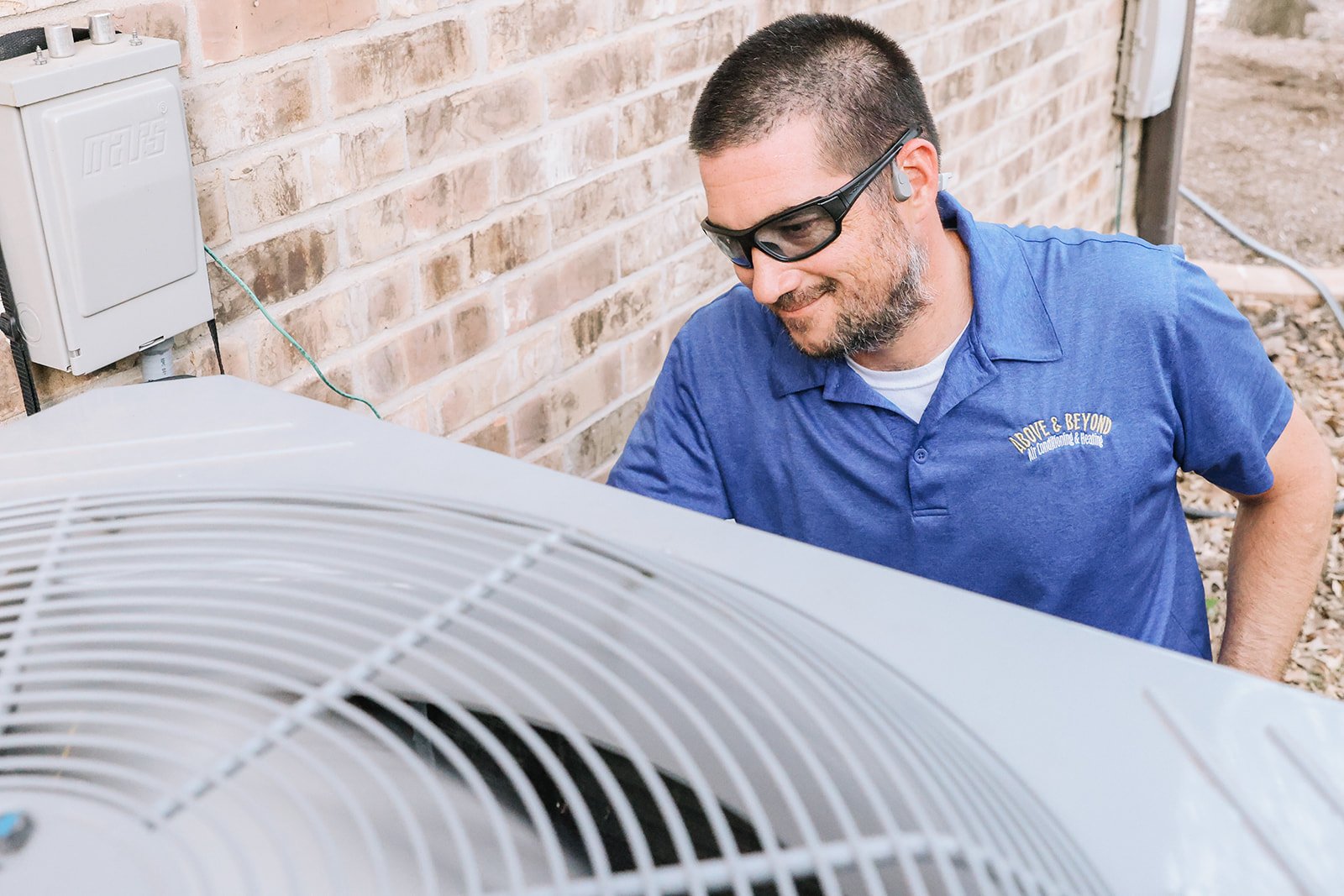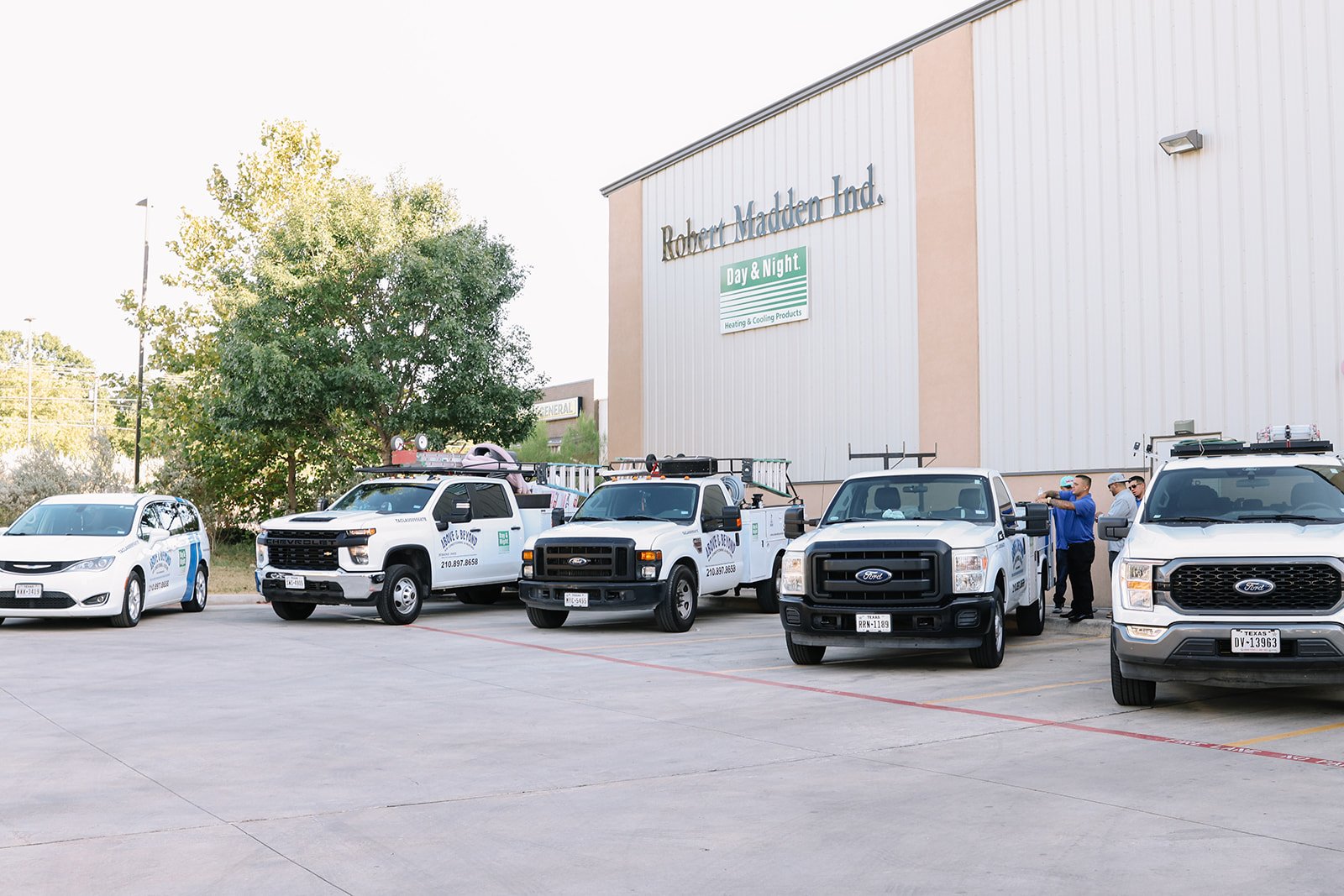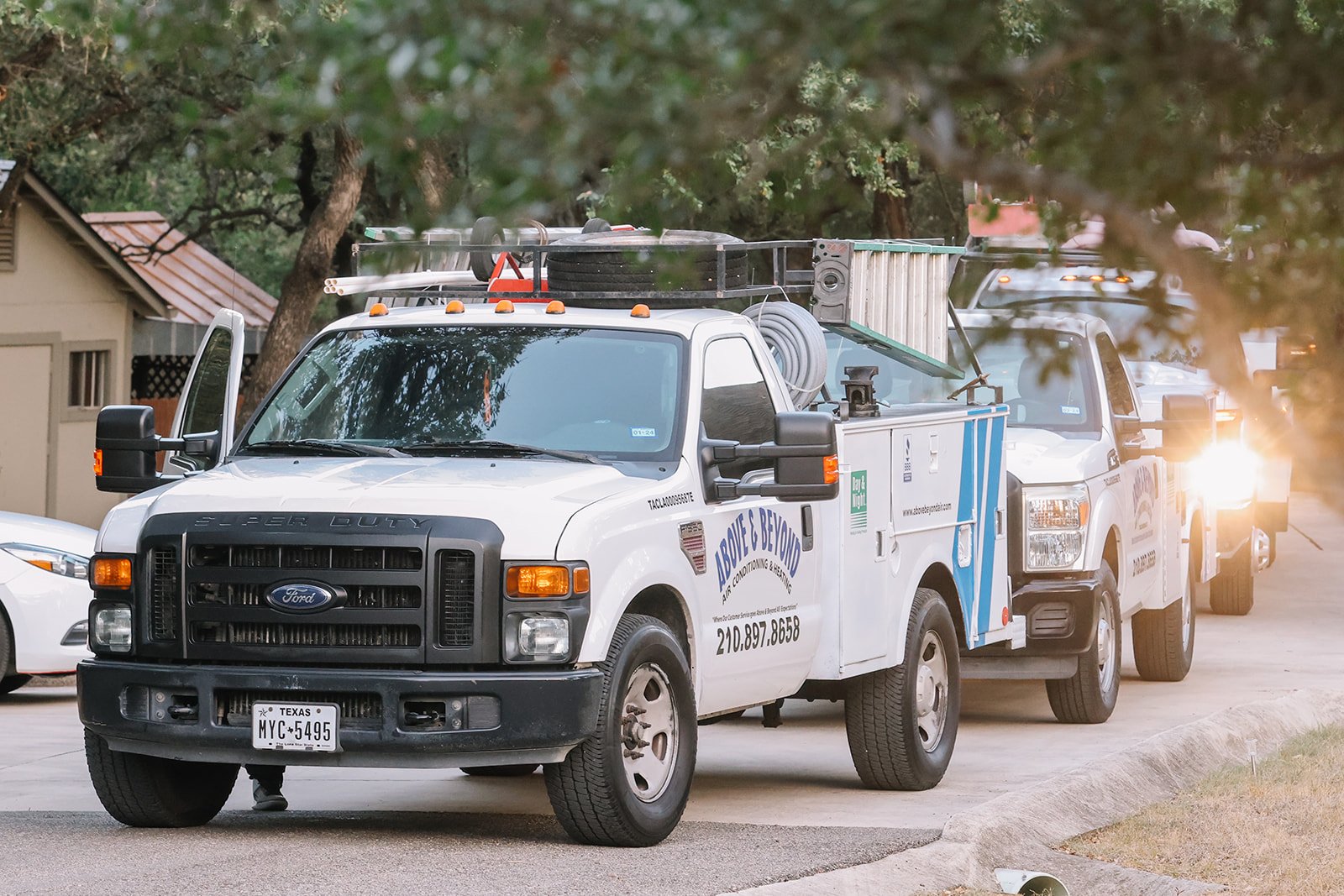
AC Refrigerant Leak Repair in San Antonio, TX
WE SERVE SAN ANTONIO, HELOTES, BULVERDE, CANYON LAKE, NEW BRAUNFELS, SCHERTZ, AND CIBOLO
All air conditioning systems need AC refrigerants to function correctly. The refrigerant (broadly called Freon, which is one brand of refrigerant) typically comes in liquid form and travels inside the copper coil system of the AC unit. It absorbs the heat inside the home, which evaporates into hot gas, while the fan blows cooled air back into the house. The AC pump pushes the gaseous refrigerant to the outdoor AC unit, where it cools before traveling back inside. The process is then repeated.
The bursts of fresh air inside come from the AC refrigerant evaporating once it meets the warm air inside the indoor AC unit. In a functioning system, the AC’s coils are enclosed loops, and normal AC function doesn’t “spend” refrigerant, meaning that the initial fill during installation ideally lasts forever. However, the evaporator and condenser coils can spring a leak.
Most property owners tend to overlook the need for regular AC maintenance until they require a refrigerant leak repair. Considering the high cost of repairing a refrigerant leak, it’s crucial to always keep an eye on this system. A refrigerant leak repair requires the attention of a licensed technician to assess the situation and provide the best solution for a home AC leak repair.
Once the AC starts leaking refrigerant, it won’t work optimally, and it takes longer for the air inside the home to cool down. In the summer, an AC refrigerant leak can be incredibly frustrating. At Above & Beyond Air Conditioning & Heating, our team understands the discomfort of a poorly functioning AC. Our team provides reliable and trustworthy Freon leak repair services and assures swift response timelines.
OUR REVIEWS - Freon Leak Repair San Antonio, TX
Our customer service goes Above and Beyond all expectations.

Cities we Serve
San Antonio, Hollywood Park, Hill Country Village, Timberwood Park, Longhorn, Castle Hills, Balcones Heights, Shavano Park, Leon Springs, Live Oak, HelOtes, Canyon Lake, Schertz, Cibolo, Windcrest, Alamo heights, Converse, Selma, Bracken, Garden Ridge, Northcliffe, Kirby, Cross Mountain, Bulverde, Boerne, Marion, Leon valley, and New Braunfels
San Antonio Neighborhoods We Serve
Prospect Hill, Highland Hills, People Active in Community Effort, Vance Jackson, Alamo Farmsteads-Babcock Road, South-Southwest, Great-Northwest, Dellview Area, Heritage, Palm Heights, Highland Park, Northwest Crossing, Lackland Terrace, Stone Oak, Shearer Hills – Ridgeview, Oak Pk – Northwood, Greater Harmony Hills, Los Angeles Heights – Keystone, Northwest Los Angeles Heights, Quintana Community, Thompson Community, Avenida Guadalupe, Thunderbird Hills, Southwest, Hidden Cove - Indian Creek-Southwest, Rainbow Hills, Sunrise Neighborhood Coalition, University Park, Culebra Park, Mission San Jose, Beacon Hill, Pipers Meadow, Harvard Place Eastlawn, Pecan Valley, Community Workers Council, Laddie Place and North Wilson, Jefferson-Woodlawn-Lake, Kingsborough-Ridge, North Central Thousand Oaks, Sonterra-Stone Oak, Woodlawn Lake, Hot Wells, Third World, Timber Ridge, Donaldson Terrace, Sierra Springs, Greater Gardendale, Friedrich Wilderness Park, Shady Oaks, Tobin Hill, Adkins, Atascosa, Castroville, Lytle, Macdona, Natalia, Somerset, Von Ormy, Alamo Ranch, Bandera, Braun Station, Fair Oaks Ranch, Medina, Pipe Creek, Bergheim, Churchill Estate, Deerfield, Green Spring Valley, Hills and Dales, Hunters Creek, Huntington Place, Monte Vista, Shavano Heights, Spring Branch, Steubing Ranch, The Dominion, Woods of Shavano, Encino Park, Redland Oaks, Seguin, Universal City, Elmendorf, La Vernia, and St. Hedwig
San Antonio AC Refrigerant Leak Causes
Physical damage:
Impact on the AC unit can cause serious damage. A strong wind can toss a branch or children playing outside might accidentally throw something and hit the outdoor unit. Outdoor units in the yard suffer from dirt accumulation or grass-cutting build-up. Homeowners can install the unit at a higher and safer location to avoid this issue. Building a protective barrier around the unit is also a great way to protect it from physical damage.
Formic acid or formaldehyde:
Formaldehyde gas occurs naturally in every home. While the latent air concentration of formaldehyde won’t harm people, it will turn into formic acid inside the evaporator coils. This mild acid can corrode the copper coils and eventually form pin holes where the refrigerant can escape.
Vibrations:
The outdoor AC unit houses a high-powered motor inside its compressing unit, which tends to vibrate when the AC is running. If the system is installed correctly, this doesn’t pose a problem, and most certified technicians will advise adding vibration isolators to protect the unit.
However, if the unit isn’t installed correctly, the excess vibration from the motor weakens the refrigerant coils, ultimately causing fractures that allow the refrigerant to seep out of the system. The copper refrigerant line clamping system can also become loose and keep brushing against the system’s strut. The continual wear can create holes inside the unit leading to Freon leaks.
AC unit wear and tear:
Wear and tear is one of the most common causes of AC refrigerant leaks. Most AC unit parts are metal, but some are covered with O-seal rubber rings to prevent leakage. When continuously exposed to changing temperatures and moisture, these parts degrade, allowing the refrigerant to leak slowly out of the system. An professional can replace them.
Improper installation:
A faulty AC installation can cause a refrigerant leak by overtightening the unit’s flare connection. For this reason, property owners need to hire licensed professionals when installing AC units in their homes.
Signs of an Air Conditioner Refrigerant Leak in San Antonio
Decreased cooling ability:
Homeowners should have the AC checked by a technician if the unit can’t keep temperatures down during hot seasons. An AC system that cannot meet household demands indicates that the AC cooling power is diminished.
Humid indoor air:
Air conditions also act as dehumidifiers to remove moisture inside the home. While this helps to keep the air dry, when there’s a Freon leak, the air will become humid due to the introduction of moisture to the space. Homeowners are also likely to experience issues such as mold when this happens.
Reduced airflow:
Reduced airflow limits the ability of the AC to cool the home effectively. Once it leaks, the refrigerant freezes on the coils and causes airflow issues which can escalate to compressor damage.
Long cooling cycles:
The easiest way homeowners can tell that their AC refrigerant levels dropped is by observing the vents and monitoring the duration between bursts of fresh air. If these cooling cycles take longer than usual, the unit will likely have a refrigerant leak.
Chloroform-like smell:
Coolant smells similar to chloroform. If homeowners notice a distinct sweet smell coming from the air vents on their AC unit, that can indicate a Freon leak. Freon is dangerous to human health, and homeowners should call in a technician immediately after they notice this odor.
Unexpectedly high electricity bills:
An increased electric bill is another tell-tale sign of a likely refrigerant leak in the AC unit. Without sufficient coolant in the system, the AC works harder and for longer to lower the home temperature, causing the electricity bill to skyrocket during summer.
Freon Leak in San Antonio: What to Do
Homeowners shouldn’t ignore freon leaks. They can be harmful to people’s health and are also a cause for environmental concern. Homeowners should take note of what they should do to keep themselves and everyone in the home safe in case a Freon leak occurs.
If the AC unit’s coolant is leaking, switch the AC off. Otherwise, the AC will release more Freon and degrade further.
Homeowners can also check the condensate drain pipe located in the outdoor unit for blockage. Use the appliance manual to identify the pipe depending on the specific system, but it’s usually colored white or copper. Connect the pipe’s end to a vacuum cleaner to suck out any debris that might have caused the blockage.
If this fails, clean or replace the air conditioning filters. They accumulate a lot of grime and dirt that can cause the refrigerant to leak by preventing sufficient airflow within the evaporator coil.
But like every technical facet of life, homeowners should allow well-trained experts to handle this issue. To avoid recurrence and ensure no further damage, a licensed technician can solve the problem correctly.

AC Refrigerant Leak Repair FAQS
-
An AC becomes a glorified wall fan without refrigerant in the lines. The refrigerant travels throughout the copper coil system, absorbing heat and bringing in cool air. It continually goes through this process to ensure the room’s temperature aligns with the thermostat settings. ACs can’t perform efficiently in the absence of a refrigerant.
-
Homeowners can identify leaks through visual inspection. Any oil traces on the unit or ice on the coil might signify a refrigerant leak. But the trusted methods are better applied by HVAC technicians. They can use professional equipment, such as fluorescent leak detectors or halogen lamps, to help detect a possible Freon leak.
-
A leak can be dangerous because refrigerants are flammable, colorless gases. They can make detecting leaks challenging, and if the AC unit is positioned near a heat source, they pose a fire hazard. Some of the chemicals used as refrigerants are also toxic in nature. Continuous exposure to this pollutant can lead to chemical poisoning. Homeowners should handle any signs of refrigerant leaks immediately.
-
Residential properties utilize two primary brands of refrigerants in their AC unit, Freon (R-22) and Puron (R-410A), but other chlorofluorocarbons are also used (such as R-545B). Freon was popular in the past, but Puron replaced it due to its environmental friendliness and energy efficiency compared to the rest. Refrigerants for commercial or industrial ACs include R-407c, R-134a, R-32.
-
Freon is a brand of AC refrigerant. It is non-flammable and usually comes packaged in a green compressor. Though it was one of the earliest refrigerant solutions, it’s become less popular due to its potential damage to the ozone layer. Due to its widespread use, AC refrigerants are broadly (and mistakenly) called Freon. Newer units use Puron or another alternative.
-
Yes. While the leak’s location may dictate the leak rate when the AC runs compared to when the thermostat is switched off, a decent amount of coolant will escape the system either way.
-
An AC refrigerant leak can cost from $200 to $1,400 on average to repair and includes the AC leak test, labor, and refrigerant refilling costs. Several factors will determine the cost, such as AC accessibility, parts replacement, and scale of damage. The warranty on the AC parts can also significantly impact the repair costs.
-
Refrigerant is essential for cooling your home. In San Antonio’s extreme heat, even a small leak reduces efficiency, leading to high energy bills and poor cooling.
-
Weak cooling, ice buildup on coils, and higher utility bills are common signs. These issues usually worsen during peak summer use in San Antonio.
-
Minor leaks can often be sealed, but larger or recurring leaks may require part replacement. For older San Antonio units, replacement may be the better option.
-
Corrosion, vibration, and heavy run times are common causes. San Antonio’s humid climate can accelerate coil corrosion, increasing leak risks.
-
Repairs often cost a few hundred dollars, depending on the type of refrigerant and severity of the leak. Prices may rise if major parts need replacement.
-
No, running your system with low refrigerant strains the compressor and may cause full system failure. It is especially risky in San Antonio’s summer heat.
-
Most leak repairs and recharges are completed within a few hours. It allows San Antonio homeowners to restore cooling quickly.
-
Parts may be covered, but the refrigerant itself is usually excluded. San Antonio homeowners should check warranty details for clarity.
-
Regular tune-ups, cleaning coils, and catching small leaks early help prevent bigger problems. Maintenance is key in San Antonio’s climate.
-
No, R-22 is phased out nationwide. Most San Antonio systems now utilize newer, eco-friendly refrigerants, such as R-410A.
Homeowners should hire professional technicians to fix AC refrigerant leaks in San Antonio.
The Above & Beyond Air Conditioning & Heating team has built its expertise upon years of experience and training that enables them to handle AC refrigerant leaks. Our team has also invested in quality tools and equipment to ensure they perform the repair accurately and efficiently at reasonable costs.


